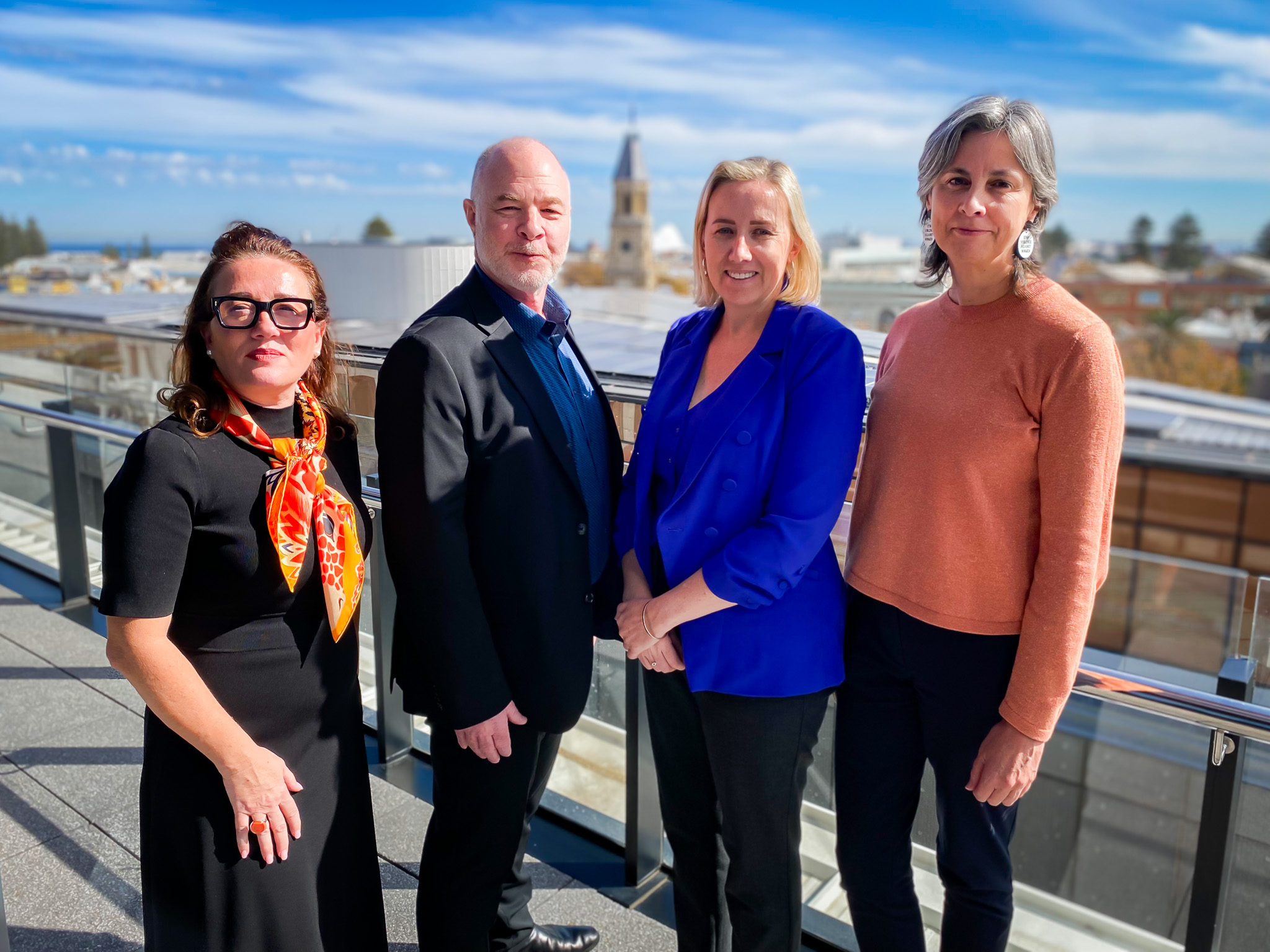
Image: Dr Jackson Katz with Communities leaders Caroline Tavares, Adelaide Follington and Selina Getley
Preventing family, domestic and sexual violence continues to be a focus and high priority for the WA Government and requires an ongoing partnership approach involving coordinated responses across government and non-government sectors.
Sponsored by Communicare, Communities Strategy and Partnerships division recently hosted a discussion and online webinar on Wednesday 22 May with renowned international speaker Dr Jackson Katz, whose gender violence prevention and education spans decades.
Dr Katz visit and presentation provided an invaluable opportunity for our people to hear him talk to topics which affect, in some way, all of our work, and have a tremendous impact on the Western Australian community.
Caroline Tavares, Assistant Director General People and Culture, welcomed Dr Katz to his discussion at Communities and they were joined by our department’s senior leaders and Family and Domestic Violence (FDV) Taskforce members including sector representatives.
Dr Katz is an educator, author, lecturer, and social theorist who is internationally renowned for his pioneering scholarship and activism on issues of gender, race and violence. He has long been a major figure and thought leader in the growing global movement of men working to promote gender equality and prevent gender violence.
Dr Katz is co-founder of Mentors in Violence Prevention (MVP), one of the longest-running and most widely influential gender violence prevention programs in North America, and the first major program of its kind in the sports culture and the military. MVP introduced the “bystander” approach to the sexual assault and relationship abuse fields.
Manager of our FDV Response Team (within the Office of Prevention of Family and Domestic Violence), Fiona McQuisten, shared her insights on Dr Katz’s visit.
“We held a presentation for all members of the statewide FDV Response Teams, and Dr Katz presented his research on the use of language in describing family and domestic violence, how responsibility can be shifted, or in many cases removed if sentences are poorly structured.
“The difference between “Andrew assaulted Mary” and “Mary is an abused woman” is significant in that ‘Andrew’ – identified as the person who chose to use violence against ‘Mary’ is not included in the sentence which effectively shifts the burden of responsibility to Mary as a victim-survivor.
“The use of accurate information, that actually holds perpetrators to account is critical, and will hopefully invite meaningful conversation around important issues that are too often considered to be ‘women’s issues’ rather than men’s issues and shared responsibilities,” Fiona McQuisten said.
Acting Women’s Interests Manager Adelaide Follington also attended the discussion and shared Fiona’s sentiments. Adelaide said Dr Katz made it clear that men need to take responsibility and be actively involved in preventing, calling out and addressing gender violence.
“The language we use when discussing gender violence is important. By using language that identifies the active agent shifts the focus from the victim to the perpetrator, we can challenge societal norms and attitudes that perpetuate men’s violence towards women.
“Engaging men and boys in conversations about gender violence can be a powerful catalyst for change. By challenging the prevailing definition of manhood and promoting healthy relationships, we can create a culture of respect and equality.
“Understanding the causes of gender violence is crucial. It is not solely a result of individual actions but is entrenched in social, cultural, and structural factors,” Adelaide Follington said.
Other key insights from Dr Katz’s presentation included:
- Prevention and intervention programs should focus on educating and empowering individuals, as well as addressing systemic issues. This includes promoting consent education, bystander intervention, and challenging gender stereotypes.
- Intersectionality plays a significant role in gender violence. Recognising how factors such as race, class, and sexuality intersect with gender can help us understand and address violence more effectively.
- It is essential to engage multiple stakeholders, including government, education institutions, community organisations, and the media, to create a comprehensive and coordinated response to gender violence.
Dr Katz met with members of the WA’s gender equality strategy Stronger Together Implementation Group; and with FDV Response Teams during his visit. The FDV Taskforce was convened in September last year to provide advice to Government about ways to strengthen responses to family and domestic violence.
For more insights by Dr Jackson Katz, visit our full-length online webinar.
For more information on our work on the prevention of family and domestic violence, visit our Prevention of family and domestic violence website.
For more information on our work on advancing gender equality, visit our Women’s website.


